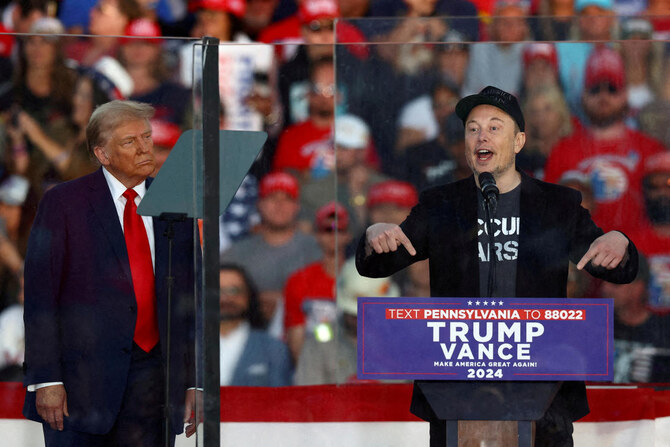LOS ANGELES, United States: A raft of celebrities from Taylor Swift and Beyonce to George Clooney and Harrison Ford proved unable to prevent Kamala Harris’s crushing defeat in the US election, underlining the limited impact of sweeping star endorsements on voters.
Instead it was Donald Trump and the Republicans — who received scant support from the entertainment industry at large, but tapped into a targeted subset of well-known, hypermasculine influencers — who won comfortably.
So, did the Democrats’ long-standing Hollywood and music industry connections, including last-minute rally appearances from Lady Gaga and Jennifer Lopez, make any difference at all in the end?
“Not in this election, clearly,” said New York University arts professor Laurence Maslon.
“At the end of the day, people probably realize that Beyonce and George Clooney don’t have to worry about the cost of gas or the cost of eggs — so maybe they’re sort of irrelevant,” he told AFP.
Celebrity endorsements have long been part of the fabric of US elections, harking back to the days when Frank Sinatra wrangled the “Rat Pack” to support John F. Kennedy in 1960.
Even this year, Hollywood-led fundraisers helped raise tens of millions of dollars for Harris’s record-breaking campaign war chest.
But their impact in actually influencing votes has always been a “mixed bag,” said Arizona State University associate professor Margaretha Bentley, who teaches a public policy course on Taylor Swift.
“It’s never going to be the golden ticket that everybody’s looking for,” she said.
Mark Harvey, author of “Celebrity Influence: Politics, Persuasion, and Issue-Based Advocacy,” agreed that we “shouldn’t be terribly surprised” by the lack of celebrity impact.
“There isn’t a real strong science behind this idea that celebrities can influence people to vote for candidates,” he said.
Famous supporters have only ever been effective when advocating on very specific issues on which they are widely regarded as expert, added Harvey.
As Donald Trump delivered his victory speech early Wednesday, the new president-elect was flanked by — and showered praise on — famous names from the world of sport.
UFC boss Dana White was lovingly hailed as “tough” and “a piece of work,” while golfer Bryson DeChambeau was celebrated as “fantastic” and even having a “slightly longer” drive than the golf-loving Trump.
Loud cheers — and a significant portion of Trump’s address — were devoted to his best-known supporter of all, tech billionaire Elon Musk.
Trump also received a last-minute endorsement from Joe Rogan, the influential host of one of the world’s top podcasts.
The Republican may have benefited from these associations because, in an election “largely driven by cultural issues, one of the most potent cultural issues was masculinity,” said Harvey.
“This sort of ‘be a real man,’ the Trump ‘macho’ sort of thing... it’s the kind of thing that Joe Rogan plays all the time.”
For the Democrats, this latest scarring experience will require a “deep self-analysis... of what they did and didn’t do, and what might have been successful,” including with celebrity endorsements, said Bentley.
Ashley Spillane, author of the report “Celebrities Strengthening Our Culture of Democracy,” agreed there was “debate” about the “value and impact of celebrity endorsements of candidates.”
But there is still “robust evidence that celebrities do have a real impact in promoting overall, nonpartisan civic engagement,” she wrote via email, pointing to Swift’s endorsement of Harris, which was credited with driving 400,000 people to a voter registration site.
Even if their endorsements failed, Hollywood celebrities showed no indication Wednesday that they would remain silent.
Waking up to the news of Trump’s victory, several well-known figures took to social media to vent their frustrations.
Oscar winner Jamie Lee Curtis said Trump’s win would usher in “a sure return to a more restrictive, some fear draconian time.”
“Fascist with total power... That may have been the last free election,” wrote actor John Cusack. “Horror is coming.”
Pop singer Cardi B, who appeared at a Harris rally last Friday, simply wrote: “I hate yall bad.”




























